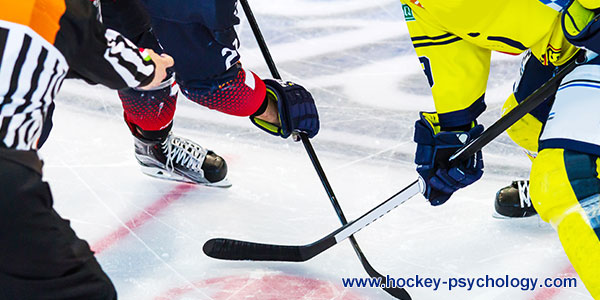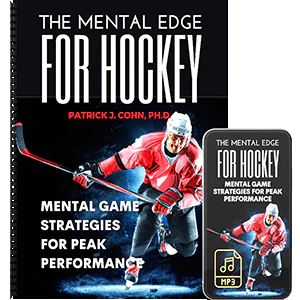
How to Help Hockey Players Succeed
Motivate or de-motivate… that is the question. As a hockey parent or coach, you want to see your athletes succeed in their sport.
You drive them to early morning practices, often many miles away. You change your schedule to accommodate practices and games. You buy the best equipment you can afford to give them every edge possible.
You give them feedback after games hoping those tips will improve their play in games. You push your athlete to work hard in practice. You tell your athletes that if they put more effort into their games, they will advance quicker and be better.
With all the investments in time and money, you want to see some kind of payoff. You want to see your athletes excel in hockey and you want your athlete to be happy.
But When does Pushing your Athletes to Excel Become Pressure?
That is the exact question asked by a hockey parent in our Mental Game of Hockey Survey:
“How can I push my kid but let him be a kid? The pressures to be in travel and not play in house can be immense especially in our area. He is too good for house but disappears in travel.”
That is a great question… When does pushing help motivate and at what point does pushing cause your athlete to feel excessive pressure and decrease their motivation?
For you, the scene unfolds as follows…
You see how talented your child is. You tell your child, “You have so much talent that you should play travel hockey. You are much better than players in travel hockey.”
You feel playing ‘in house’ is a step down for your child and a waste of their talent. With all that encouragement, your child seems to hold back during travel games and you can’t understand why.
You keep reminding your child how talented they are and point to how dominant they play during ‘in house’ games, but nothing seems to help. You are so frustrated that there are times you even get angry and further exacerbate the problem.
What exactly is the issue at play? Despite your best intentions, your athlete may misinterpret the message. At times, unknowingly, you may be placing high expectations on your athletes. The more invested you become in their hockey performance, the more pressure they may feel.
For example, as you tell your athletes how much potential they have and how good they can be if they just put in more effort, they hear something different. Your athlete interprets that message as they are not living up to your expectations or their potential.
Perceived high expectations increase feelings of pressure. High expectations cause your child to hold back because they fear potential failure. High expectations hold your child back from their potential.
Minimizing the expectations on your athletes will allow them to experience less fear and pressure, giving them the opportunity and motivation to play successfully at the next level.
Helping your Athletes to Succeed at the Next Level
Balance is the key to help your athletes perform well at the next level. Some children may not be highly self-motivated. Make sure you talk to the person and not just the hockey player.
Ask your athletes how much input they want from you to improve their game. Allow your athletes to take the lead on the additional training they engage in, what level they want to play, and how much you talk about improving their performance.
Related Articles on Hockey Mental Game:
- How to Boost Production on the Ice
- Overcome Pressure Packed Expectations in Hockey
- Improve Your Hockey Skills with Smart Practice
*Subscribe to The Sports Psychology Podcast on iTunes
*Subscribe to The Sports Psychology Podcast on Spotify
The Mental Edge for Hockey

The Mental Edge for Hockey teaches you proven and simple mental game strategies so you can overcome fear of failure, lack of confidence, slumps or poor composure, take your practice game to competition, and boost your confidence in hockey. You learn simple, actionable mental game strategies to help you perform at your peak!
I’ve worked with athletes for 30 plus years – and know the top challenges that undermine performance when you perform in games. Now you can tap into my expertise and experience in coaching hockey players on the mental game.
In this program, you’ll learn the TOP 10 mental training lessons for hockey players – the same strategies I teach one-on-one athletes I coach on the mental game. My clients pay thousands of dollars for personal coaching, but now you can have the same strategies to improve your mental game – at a fraction of the price.
Leave a Reply